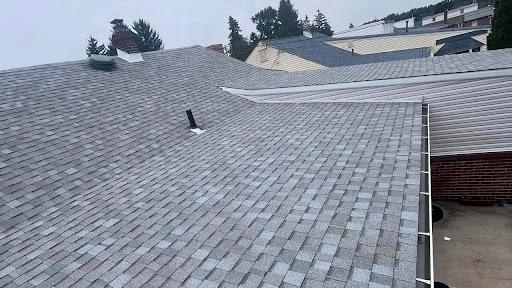Blogs

What Type Of Nails For a Shingle Roof?
For a shingle roof, it's best to use galvanized roofing nails with a minimum length of 1 ¼ inches and a large, flat head to ensure proper holding power and prevent leaks. When it comes to roofing, selecting the right nails for your shingle roof is crucial to ensuring a secure and long-lasting installation. The type of nails used can significantly impact the durability and performance of your roofing system.
At Northeast Exteriors, we understand the importance of quality materials in roofing, and we’re dedicated to providing top-notch service and expertise to our clients in Palmyra and beyond. In this article, we'll explore the different types of nails used for shingle roofs, their benefits, and how to choose the best option for your project.
Key Takeaways
Galvanized Steel Nails: Best for most asphalt shingle roofs due to their corrosion resistance and cost-effectiveness.
Stainless Steel Nails: Ideal for coastal areas and heavier roof materials due to superior corrosion resistance and strength.
Aluminum Nails: Suitable for non-coastal areas and budget-friendly roofing applications.
Nail Length: Typically 1-2 inches long, ensuring penetration into the roof deck.
Nail Gauge: 10-12 gauge, with 12 gauge being the minimum thickness required.
Nails Per Shingle: Usually 4-6, with higher numbers required in high wind areas.
Types of Roofing Nails for Shingles
1. Galvanized Steel Nails
Corrosion Resistance: Galvanized steel nails are coated with zinc to resist rust and corrosion, making them ideal for asphalt shingle roofs. The zinc coating provides a protective barrier, ensuring the nails maintain their integrity over time.
Popularity: These nails are the most popular choice for shingle roofing due to their balance of cost and performance. They are also preferred for roofs with warranties because of their durability.
Usage: Galvanized steel nails are recommended for most roofing applications, offering a reliable and cost-effective solution.
2. Stainless Steel Nails
Durability: Stainless steel nails are highly resistant to corrosion and rust, making them a suitable option for coastal areas where salt can accelerate deterioration.
Strength: These nails are stronger than galvanized steel, which can be advantageous for roofs with heavier materials such as slate or tile.
Cost: While stainless steel nails are more expensive than galvanized steel, their longevity and resistance to extreme conditions justify the higher cost.
3. Aluminum Nails
Lightweight and Cost-Effective: Aluminum nails are lightweight and relatively inexpensive compared to other types. They are often used for metal roofs, composite shingles, and some asphalt shingles.
Limitations: Aluminum nails are not recommended for coastal regions due to their susceptibility to salt corrosion. They are best suited for non-coastal areas and applications where cost is a primary concern.
Nail Size and Length for Shingle Roofing
Standard Length: Roofing nails are typically 1-2 inches long. The length of the nail ensures it penetrates through the shingle and into the roof deck adequately.
Penetration: The nail should penetrate at least 3/4 inch into the roof deck to provide a secure hold.
Longer Nails: For thicker shingles or additional accessories like ridge vents, longer nails may be required. It’s essential to choose a nail length that suits the specific requirements of your roofing project.
Nail Gauge for Shingle Roofing
Thickness: The gauge of the nail ranges from 10 to 12, with 12 gauge being the minimum thickness allowed by most building codes. A thicker gauge provides better holding power and durability.
Number of Nails Per Shingle
Standard Recommendation: Most manufacturers recommend using 4-6 nails per shingle. This ensures proper adhesion and reduces the risk of wind uplift.
High Wind Areas: In regions prone to high winds, building codes often require 6 nails per shingle to enhance the roof’s resistance to wind damage.
Local Codes: The number of nails required can vary based on the shingle type and local building codes, so it’s important to adhere to these regulations.
Key Roofing Tips
Choosing the Right Roofing Material for Your Home
Selecting the right roofing material is crucial for durability and aesthetics. Here are key options:
Asphalt Shingles: Affordable and easy to install. Popular for residential roofs.
Metal Roofing: Long-lasting and energy-efficient. Ideal for various climates.
Tile: Offers a distinct look with high durability. Higher cost and complex installation.
Slate: Extremely durable and attractive but comes with high costs and installation challenges.
Understanding Roofing Warranties
Roofing warranties vary by material and manufacturer. Key points to consider:
Coverage: Typically includes defects in materials and workmanship.
Duration: Terms can differ; review the specifics of what is covered.
Transferability: Some warranties can be transferred if you sell your home.
Validity: Proper installation and maintenance affect warranty validity. Work with reputable companies to ensure coverage.
The Importance of Proper Roof Installation
Correct installation is essential for a roof’s longevity and performance. Key aspects include:
Nail Placement: Proper nail placement ensures secure shingle attachment.
Shingle Alignment: Accurate alignment prevents leaks and ensures durability.
Sealing: Effective sealing is crucial to prevent water damage.
Professional Installation: Hire experienced roofers to adhere to standards and protect your investment.
Frequently Asked Questions About Roofing
1. What kind of nails to use for wood shingles?
Use galvanized steel or stainless steel nails for wood shingles to prevent rust and ensure durability.
2. Do you need 3 or 4 nails for shingles?
Typically, 4 nails are recommended for each shingle to ensure secure attachment and prevent wind uplift.
3. Can you use a roofing nailer for shingles?
Yes, a roofing nailer is commonly used for installing shingles, speeding up the process and ensuring consistent nail placement.
4. Is it okay to put screws in roof shingles?
No, screws are not recommended as they can cause leaks and are less effective at securing shingles compared to nails.
5. How do you secure shingles on a roof?
Secure shingles by nailing them properly in the designated spots, ensuring they overlap correctly, and sealing them to prevent leaks.
Choose the Right Nails for a Secure Shingle Roof with Northeast Exteriors
Selecting the appropriate nails for your shingle roof is essential to ensuring a durable and secure installation. At Northeast Exteriors, we prioritize quality and customer satisfaction, providing expert advice and top-notch service for all your roofing needs. Whether you're installing a new roof or repairing an existing one, our team is here to help you choose the best materials and ensure a flawless installation.
Don’t wait – reach out to us now for a free estimate and let us help you achieve a secure and reliable roof. Contact us today and experience the Northeast Exteriors difference!
Hours
Monday: 8:00AM - 6:00PM
Tuesday: 8:00AM - 6:00PM
Wednesday: 8:00AM - 6:00PM
Thursday: 8:00AM - 6:00PM
Friday: 8:00AM - 6:00PM
Copyright © Northeast Exteriors 2025. All Rights Reserved. Privacy Policy. Terms & Conditions. Web Design by Fused Media





